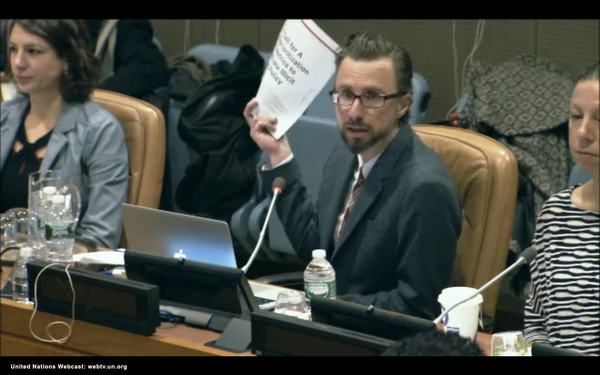Scientific experts launch open letter on need for new metrics to evaluate drug policy
On January 21, 2016, more than eighty representatives from Member States, UN agencies, and civil society organizations gathered for the launch of a scientific open letter on the path forward for drug policy evaluation.
Titled, “Identifying Common Ground for UNGASS 2016: Rethinking Metrics to Evaluate Drug Policy,” the event hosted by the International Centre for Science in Drug Policy (ICSDP) at the United Nations Headquarters in New York City provided valuable expertise and guidance to Member States and UN agencies in the lead up to the United Nations General Assembly Special Session on Drugs (UNGASS) in April 2016.
The ICSDP’s open letter calls for a reprioritization of the metrics used to evaluate illicit drug policy. Co-authored by ten global scientific leaders, the open letter uses decades of scientific research to demonstrate that the small number of indicators currently prioritized by the vast majority of UN agencies and Member States – such as levels of illicit drug use and availability – fail to capture the complex ways that drug policy can impact communities. The open letter therefore argues for the adoption of indicators in the areas of health, peace and security, development, and human rights in order to provide a broader and more granular understanding of drug policy impacts. This, in turn, would equip policymakers with the data required to optimize outcomes and substantively control the world drug problem.
Dr. Dan Werb, Director of the ICSDP, focused his presentation on the development challenges that have undermined the successful implementation of Mexico’s drug policy reform. In 2009, Mexico decriminalized the possession and use of small amounts of drugs and legislated a system of diversion that would see drug dependent individuals triaged into drug treatment rather than prison. Despite one of the most progressive drug policies on the books, research measuring the effectiveness of the policy reform in Tijuana – conducted by Dr. Werb and colleagues at the University of California, San Diego – indicates that implementation has fallen short of expectations, as the number of arrests for drug possession in Tijuana have continued to rise despite the policy of decriminalization. According to Dr. Werb, this can be at least partially attributed to the lack of capacity of the Mexican state to provide members of law enforcement with adequate levels of pay, as well as training in the basic tenets of the drug policy reform. Problematically, although a cornerstone of the drug policy reform relies on increased coverage and accessibility of evidence-based addiction treatment, such as methadone maintenance therapy (MMT), resource constraints have resulted in a lack of adequate treatment scale up. Dr. Werb concluded his presentation by emphasizing that, as the Mexican case study demonstrates, a lack of resource commitment by Member States can seriously undermine drug policy goals and development indicators must therefore be captured in drug policy evaluations.
Click here to read the full article.
Keep up-to-date with drug policy developments by subscribing to the IDPC Monthly Alert.
Regions
Related Profiles
- Kanna Hayashi
- Harm Reduction International (HRI)
- Dan Werb
